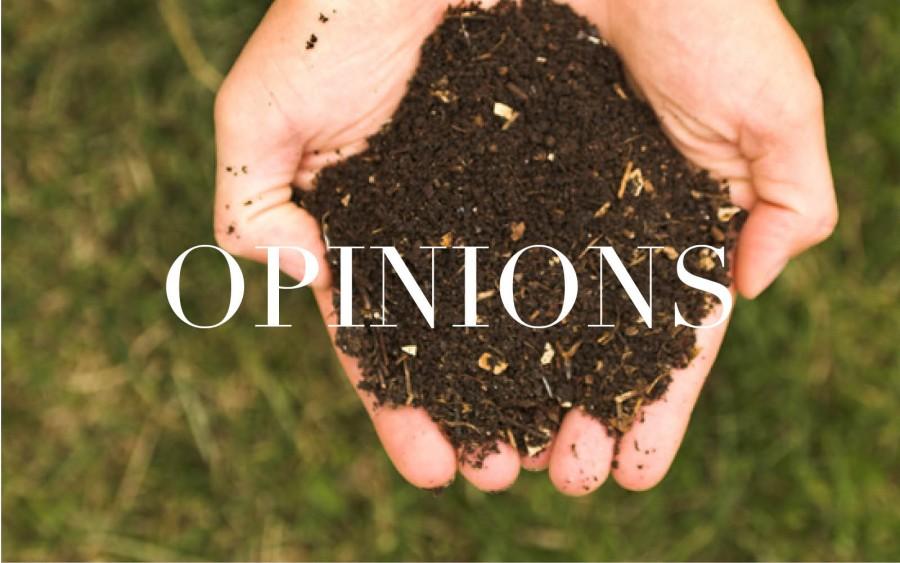The Renaissance of Composting: Keeping Up with Everyone Else in the Game
February 19, 2015
The students of Managing for Sustainability II (MSUS 301) would like to use this section to engage the University community in a discussion about sustainability. They have been tasked with the assignment to develop projects dedicated to making the University campus and surrounding community more sustainable. Each week, a new student-initiated project will be highlighted in this section. Regardless of the outcomes of the individual projects, it is the hope of these projects to create a lasting impression and spur additional thoughts and ideas within the community.
The average American generates approximately 220 pounds of food waste per year, which is 13.75 percent of a person’s total waste. In terms of the University’s undergraduate population, our cumulative food waste weighs about 300 Honda Civics. That’s enough Hondas to fill the entirety of Gateway Drive and both Smith and Hunt parking lots.
Simple online research of the University’s peer institutions—Colgate, Lehigh, Villanova, and Cornell for example—confirms that each school has a composting program. Penn State composts, along with other leading liberal arts institutions, including Bowdoin, Colby, and Bryn Mawr. Meanwhile, the University’s Sustainability Initiative is aiming to embrace sustainability as a core principle of 21st-century thinking. So why doesn’t our University compost?
We composted in 2011. You can Google “Bucknell composting” and an archived page written by Julia Ferrante comes up, citing the partnership between Parkhurst Dining Services and a local farm. By the time I arrived at the University in fall 2012, we had stopped composting–perhaps because it was not cost effective. But beyond cost effectiveness, the problem that arises as a result of not composting is the impairment of our single-stream recycling viability.
For any item to be eligible for single-stream recycling, it must have less than five to 10 percent food contamination. Now think about how many times you’ve seen someone in the library drop a not-so-empty yogurt and soiled spoon into a blue bin. What you didn’t see was that not-so-empty yogurt splash all over three reams of printer paper already in the recycling bin. The entire bin is now ineligible for recycling due to contamination. Or how many times have you seen someone recycle a compostable paper plate from the Bison’s barbecue station, soaked through with pulled pork juice? Again, the bin is now ineligible for recycling due to contamination. We pay to recycle. Enough of these soiled loads together in a recycling ton and it’s no longer recyclable material. The University then has to pay to have it put in a landfill. Consider our current system’s cost ineffectiveness.
I’m not proposing we take the world by storm and force everyone to compost every grain of leftover quinoa. Let’s start out small by implementing something along the lines of the composting program that Lehigh’s Greek life participates in. A few fraternities could start with composting their leftovers from meals in an outdoor, closed-container compost tumbler or stack. These containers require little maintenance and could be placed next to the dumpsters near the fraternities.
I asked my friend about how dining at his fraternity works. He said the fraternity chef makes “x” amount of food for everyone in the fraternity and sometimes all the food will be consumed. Leftovers are put out the next day, but are rarely touched. For the most part, leftovers more than 24 hours old are trashed. When I asked him about how many pounds of leftovers he thought were thrown away each week, he said, “probably like 20 pounds or so … maybe 50 if you include leftovers.” But when asked if he would compost his leftovers, he replied, “If that was an option, definitely.” Sounds like a simple fix that could have a big impact.
Not only would generating compost material be beneficial to facilities since there would be free, on-sight soil for landscaping, but starting a composting program would be a great opportunity to engage some of the goals that the University outlined in the Advancing Bucknell University’s Sustainability Leadership Second Nature 2013 Final Report. The University would be engaging the Greek community, which the report highlighted as an influential, non-academic group in a sustainability initiative.
We attend a private, liberal arts institution that charges high fees and has a growing endowment. We have keen, passionate, and talented students and faculty everywhere you look. There has to be a way to prevent landfilling the hundreds of pounds of food we produce weekly. To do so would not only be a good way to improve sustainability as a whole on campus, but a way to save the school from, pardon the pun, throwing away money.
If you would like to converse, participate or get involved in starting a composting project on campus, please email me at nhb008@bucknell.edu. Regardless, I hope this op-ed provoked deeper thought about the absence of composting on campus.





















